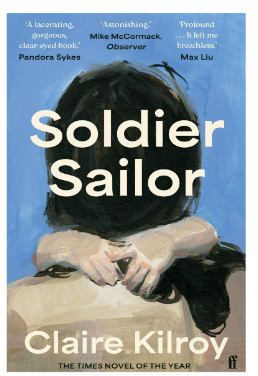This is post 1 / 6 of the Shadowing WPF 2024 series.

Not Fires on Orion and Luke, I am Your Father
A while ago, I spent six months completing the ‘Write Your Novel’ course run by Curtis Brown Creative, where 12 of the 15 of us were women. Everyone arrived with a part-written novel, and while some of these, including my own, incorporated ideas about motherhood and one foregrounded it, the range of subjects and genres was broad: thriller, dystopia, romance, mystery, historical fiction and several literary or cross-genre novels.
Claire Kilroy’s book ‘Soldier Sailor’, on the other hand, is in some respects exactly what many might expect from a novel shortlisted for the Women’s Prize for Fiction. It’s from a female perspective and is predominantly about motherhood, pushing the reader under wave after crashing wave of strong emotion from rage, self-disgust and loneliness to fear, love and hope. Settings are domestic, though we escape the kitchen for trips to the woods, beach, supermarket and playground.
It is a triumph, and one that takes this female experience and creates a language and mode expansive enough to punch through to a new dimension that can incorporate the epic scale of emotion trapped within the small, limiting physical world of many mothers of infants. Her furious narrator’s scorn for men nodding at films as violent male characters reveal pain: ‘Your fires on Orion and your Luke, I am your father,’ is stinging.
The language is dazzling, with a virtuosic range of register, borrowing imagery from physics, mediaeval life, metaphysical poets, theatre, war, religion, song lyrics and of course nursery rhyme, like the title. This isn’t mere stylistic fireworks though. The telescoping scale of linguistic operations is dynamic, collapsing from talk of thorns, Mary and Eden to the bathos of binbags, then makes us flinch from ‘stumps of writhing muscle’ and ‘chemical castration’, through the intensely aural self-loathing of the ‘schlep schlep of slippers, a slab of flab’ to the disgusted refrain ‘It’s stupid’. These contrasts illustrate the paradoxical nature of a life with interiority as huge as its external reality is small.
Kilroy captures the realities of maternity, an experience that, while some want it more than anything, many guiltily find utterly contradictory, overwhelming and brutal, even with a healthy child, even with a partner, even with a roof and food. As Kilroy puts it, coping involves ‘acting like love of this voltage is normal, domestic, even’. I recognised this - it expressed something true about my own experience for me in a new way.
She revisits themes of separation, division and a surreal sense of living a life parallel to her previous one but irrevocably separate from it. Her use of second person voice in the present tense creates immediacy that drags us into this claustrophobic Wonderland with her and her child (even as her child). This otherland is a troubling version of John Donne’s lovers who ‘made one little room an everywhere’. The omission of names contributes to the unnerving sense that no one is themselves. The idea that she has been ‘shovelling coal in the bowels of the ship’ for so long that she’s forgotten it’s a ship amplifies the sense of siege, and we want her to reach the deck with its ‘array of stars’, but the outdoors is genuinely full of dangers as well as freedom and relief in this novel.
Narration is unreliable, pointedly partisan. In fact, her narrator sometimes seems to internalise her partner’s voice, turning on herself criticisms he never uttered. Even when he said nothing, she insists, ‘It was the way he said it though.’ We are increasingly unsure what is accurately reported, what is imagined, as they play hot potato with the blame for his lack of involved fathering.
Tension is built to critical levels, and the raw hypervigilance of parents is evoked through the repeated soundscape when the narrator’s imagined ‘train tracks started to thrum, then zing’ with approaching threat. It’s almost unbearable at times, and those who’d identify most strongly with this novel could also fairly request a trigger warning to avoid PTSD, but it’s well worth the journey, and dark humour punctures the tension now and then.
This book seems to me necessary, of widespread relevance, not just to parents, and certainly not just to mothers, but to any adult who was ever a child: it helps us to thank our lucky stars that we made it past infancy. Would this be a worthy winner of the Bessie statuette? Definitely.